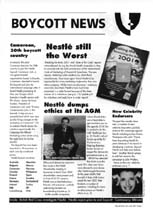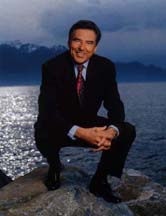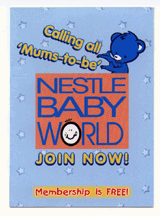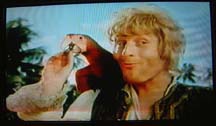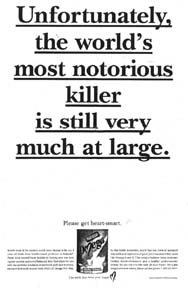|
Boycott
supporters
|
The past few
months have seen a number of new celebrity boycotters publicly
endorse the campaign against Nestlé including actress
Emma Thompson (right) who said:
"I have
been boycotting Nestlé for years because of its record
in developing countries. Boycott Nestlé and help
save babies lives".
Another British
actress to add her voice to the campaign is Julie Walters.
She said: "It
is vital that new mothers should be given the best possible
advice. This should definitely include the promotion of
breastfeeding as the best possible start for their babies.
It is iniquitous that multinationals, of which Nestlé
is a prime example, should ride roughshod over the International
Code in order to increase their profits. Please join the
worldwide boycott against Nestlé."
|
|
|
Two other celebrities
have become endorsers of the boycott in the past few months;
Zoë Wanamaker CBE (right) and Richard E. Grant.
Other long-standing
endorsers include Victoria Wood, Jane Asher, Tony Robinson,
Germaine Greer and Gerald Scarf.
|
|
Nestlé 'band'
by Musicians
|
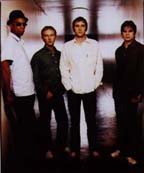
Ocean Colour Scene, who earlier this year
pulled out of a Nestlé promotion because of Nestlé's
marketing malpractice.
|
What do Pulp,
Dodgy, Cast, Ocean Colour Scene, Shed 7 and Ian Brown have
in common?
They have all
recently ditched Nestlé.
The musicians
pulled out of a Nestlé-linked promotion for the V2001
music festival or television advertisements after hearing
about the boycott. As a result Jarvis Cocker had his picture
in the British
Medical Journal and the International Code was
mentioned in the New
Musical Express - both thought to be firsts!
|
SWTUC join endorsers
The South West Trade
Unions Council passed a motion at its meeting in April to endorse
and support the Nestlé boycott. The motion, put forward
by Unison, was voted on and passed after the issue had been thoroughly
debated. The SWTUC is the first regional TUC to become an official
endorser. It is now hoped that a motion could be taken to the
national level of the TUC.
Limerick Students
give Nestlé the Boot
With an 87% majority,
Students at Limerick University passed a motion at their University
Union last month banning Nescafé from the Union buildings.
Student campaigners
raised awareness by running around the Uni pubs & restaurants
in "Vote Yes T-shirts", fake breasts, and drumming & chanting
"Hey! Hey! Ho! Ho! Nescafé has got to go". The ban
at Limerick brings the total number of Universities and student
groups in the UK and Ireland who officially endorse the Nestlé
boycott to 78.
Peter Blackburn chief
executive, Nestlé UK admitted to The Guardian (21 April
2001): "In the student sector it is a very real issue."
Help with campaigning
Contact
Baby Milk Action for help in campaigning at your school, college
or university. We have a draft resolution
you could put to your student union or other organisation. We
can help with posters and leaflets. We will also come and debate
with Nestlé.
Remember the 'milk
round' offers an opportunity to raise Nestlé's record and
the profile of the boycott.
Future
of Nestlé deal with British Red Cross in doubt
Baby
Milk Action welcomes assurances recently given by the British
Red Cross (BRC) that it does not "endorse the commercial
activities of the Nestlé company."
The
BRC has also announced it is investigating claims of Nestlé
baby food marketing malpractice.
The
announcements came after Baby Milk Action reluctantly complained
to the Charity Commission about statements made by BRC staff
as they defended a £250,000 deal with Nestlé supporting
its Linking
Lives programme.
Saatchi
and Saatchi advised Nestlé to go on the offensive, advertising
how much it gives to charity after the damning
ruling by the Advertising Standards Authority against the
company's claim to market infant formula "ethically and responsibly".
The
BRC was among four charities to benefit from Nestlé's
"philanthropic" gesture of £1 million; Kids Club Network,
Shelter and Macmillan Cancer Relief were the others (see Boycott
News 27).
As part
of the deal the BRC promotes Nescafé coffee, the principle
target of the boycott.
Save
the Children has also sent the BRC a report on monitoring which
it recently conducted in Brazil, and which found Nestlé
violations. The BRC has contracted Stephen Lee from Henley Management
College to investigate and Baby Milk Action arranged to meet
with him. This was eventually changed to a telephone interview
about governance and reputation issues.
Baby
Milk Action has asked the BRC Board again for a meeting and
for a copy of the terms of reference for the research. A meeting
with the chairman, Professor John McClure, has now been arranged.
We invite
anyone considering Nestlé sponsorship to contact
us at the outset so we can make our case.
Singapore
Baby Club
|
Nestlé
continues to defend its Baby World Club in Singapore despite
the fact that the Code of Ethics Committee states that baby
clubs are banned and companies have been told to refer mothers
with questions on infant nutrition to the health care system.
Nestlé
claims that its materials relate to Cerelac complementary
food and have been cleared by the Committee, but avoids
answering the question
"Why
does its club target pregnant women?"
See
the Campaign for Ethical
Marketing for past action sheets on this issue.
|
|
Nestlé
rejects plan aimed at saving infant lives and ending boycott
After years of refusing
to debate the baby food issue in public with Baby Milk Action,
Nestlé decided to attend a meeting with medical students
at Cambridge University on 15th March, perhaps because of its
inability to recruit graduates from Cambridge and other UK universities.
The meeting was chaired
by Professor Spencer of the Law Faculty, and we hoped the willingness
to debate signalled a new openness. In the event Nestlé
used its usual tactic of denial and deception and rejected a four-point
plan put forward by Baby Milk Action to save infant lives and
ultimately to bring the boycott to an end.
Nestlé disputed
the scope of the International
Code and Resolutions and the countries where they apply. Both
of these failings of Nestlé policy have been addressed
in the past by UNICEF and by the European Parliament.
Nestlé suggested
that film of dying infants from India was unrealistic as poor
mothers cannot afford its formula - in reality parents often over-dilute
formula to make it last longer or the whole family goes without
to meet the cost. The company claimed that it was unaware of specific
violations, insisted that they were not important or claimed that
they were in the past. Totally unacceptable practices, effectively
stopped by the Code, such as sending sales reps. into hospitals
dressed as nurses to promote products (so-called 'milk nurses'),
were done "with the best possible intentions"
according to Nestlé.
Following the debate,
Nestlé (UK) Chief Executive, Peter Blackburn, told The
Guardian, in a full back page feature, that Nestlé
had difficulty recruiting graduates in the UK. The Guardian
reported (21st April 2001): "Nestlé has recently
deployed an employee from Sri Lanka, with experience of Nestlé's
on the ground activities, to talk to students in Cambridge."
|
Blackburn says:
"She
was just shouted at, howled at. She was really shocked,
in a place like Cambridge, which she'd always understood
to be the pinnacle of academia, to be treated like that."
This in no
way reflects the debate which took place at Cambridge University
- which was filmed by Baby Milk Action.
Professor
Spencer commented on the well-mannered tone of the debate.
|
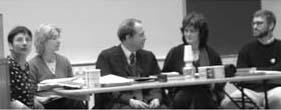
Beverley
Mirando and Hilary Parsons of Nestlé present company
policy at the Cambridge debate chaired by Prof. Spencer
with Patti Rundall and Mike Brady of Baby Milk Action. 15th
March 2001.
Photo:
Baby Milk Action.
|
Mr. Blackburn also
falsely claimed that the boycott is only active in the UK, prompting
letters of correction from boycott groups around the world.
See the February/March
2001 Campaign for Ethical Marketing action sheet for
details of how to write to Nestlé to ask it to accept the
four-point plan.
4
Point Plan
|
Nestlé's
response
|
| 1. Nestlé
must state in writing that it accepts that the International
Code and the subsequent, relevant World Health Assembly
Resolutions are minimum requirements for every country. |
Nestlé
does not accept that the Code applies to all countries, only
those on a list of its own invention and even then, Nestlé
follows its own weaker Charter rather than the Code. Nestlé
refuses to recognise that the subsequent Resolutions have
equal status to the Code. |
| 2. Nestlé
must state in writing that it will make the required changes
to bring its baby food marketing policy and practice into
line with the International Code and Resolutions (i.e. end
its strategy of denial and deception). |
Nestlé
continues to dispute any wrong-doing even in the face of documentary
evidence of malpractice, fines, convictions and rulings against
it. |
| 3. Baby Milk Action
will take the statements to the International Nestlé
Boycott Committee and suggest that representatives meet with
Nestlé to discuss its timetable for making the required
changes. |
Nestlé
has not provided the necessary statements. |
| 4. If IBFAN monitoring
finds no Nestlé violations for 18 months, the boycott
will be called off. |
Nestlé
continues to violate the Code and Resolutions in a systematic
manner. |
Democracy
- Nestlé and Adidas show contempt for it
Nestlé's marketing
of breastmilk substitutes and the conditions of workers in Adidas
factories came under the scrutiny of Members of the European Parliament
(MEPs) at a Public Hearing on 22nd November 2000, examining the
effectiveness of international standards and codes of conduct.
Organised by the Development
and Cooperation Committee, the Hearing focused on marketing in
Pakistan and why, nearly 20 years after the International
Code was introduced, baby food companies continue to be accused
of irresponsible marketing practices. The Network for Consumer
Protection in Pakistan explained how it had registered complaints
about labelling with the European Commission using export regulations
(which Baby Milk Action and IBFAN partners had helped to bring
in). The Network also presented its reports Feeding
Fiasco and Milking
Profits. These reports contain documentary evidence of company
marketing methods provided by Network's monitoring and evidence
from Syed Aamar Raza, a former Nestlé employee. These included
bribing of doctors, setting of sales targets and performance bonuses
for marketing staff and direct marketing to mothers. (Reports
can be purchased from the Virtual
Shop).
UNICEF gives evidence
UNICEF's Legal Officer,
David Clark, made a presentation on the International Code and
the subsequent Resolutions which clarify it and attempt to close
loopholes in the original text. David Clark commented:
"...two principles,
universality and the scope, including all breastmilk substitutes,
cannot be over-emphasised given the tendency of the infant feeding
industry to attempt to limit the application of the Code."
During questions, it
was noted that Nestlé's "Charter" setting out its policy,
in contrast to the Code, was limited to developing countries and
to infant formula. (Click
here for further details and the text of UNICEF and IBFAN's presentations).
Why Nestlé?
Nestlé was invited
to the Hearing because the company figures prominently in the
complaints of marketing malpractice from around the world. At
the Nestlé shareholder AGM in 1999 Chairman Helmut Maucher
said he welcomed the Hearing, but when the time came the company,
with over 230,000 employees, failed to turn up. Varying excuses
were relayed to the MEPs who were present. Richard Howitt MEP,
who arranged the Hearing, told The Independent newspaper
(23rd November) that Nestlé had demonstrated: "utter
contempt for a properly constituted public hearing. Not to attend
reveals a combination of arrogance and distance which has set
their cause back."
Baby Milk Action remarked
to Nestlé's new Chief Executive, Peter Brabeck about this
at the Nestlé AGM in April and asked was he able to address
students at the London Business School the following day.
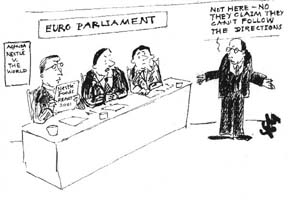
Cartoon:
Sarah Guthrie, Seg Cartoons
EME
Instead of sending
a representative Nestlé asked Sunil Sinha of Emerging Market
Economics (EME) to give a presentation. Nestlé also proposed
that the Labour peer Lord Ahmed be allowed to speak, but this
was refused. EME had conducted an audit for Nestlé in Pakistan
- which significantly failed to look at Syed Aamir Raza's evidence.
EME mentioned Nestlé's
incorrect interpretation of the Code and Resolutions (see Update
28).
European Commission
A representative of
the European Comission commented on its failure to act on the
labelling violations reported to it by The Network.
Richard Howitt MEP
called for a review of the procedures to clarify which organisations
are the "competent authorities" to register complaints and why,
when complaints had been submitted, they are not acted upon. (see
also Update 29).
The
'facts' about the Public Hearing - two points of view
"Adidas,
Nestle, and other UN officials were also invited, but
due to scheduling conflicts, sent their regrets."
Nestle's
'Babymilk issue facts' website, 29/11/00
"After
numerous attempts to 'influence' the programme, both companies
chose to boycott the hearings."
Richard
Howitt MEP, organiser of the Hearings, 10/04/01
|
@Bristol
faces continued public critisism over link with Nestlé
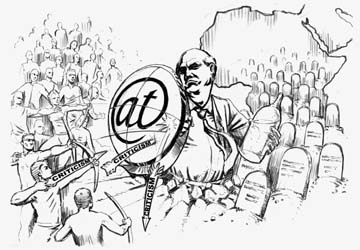
@Bristol
cartoon used on posters in Bristol to raise awarenes of the Nestlé
boycott
A group
of Bristol residents, angry at Nestlé's continued involvement
with @Bristol, decided to use a bit of positive advertising by
distributing a whole series of posters around Bristol aimed at
informing people of Nestlé's record of marketing malpractice,
and of how @Bristol has become Nestlé's buffer-zone to
absorb criticism.
The posters
denounced the hypocrisy of a company whose marketing practice
is contributing to the deaths of millions of babies around the
world, while being involved in an educational project aimed at
children.
@Bristol
recently held an open evening for science teachers to see the
facilities on offer. Baby Milk Action members, joined by local
residents, were also there to offer a different perspective. As
teachers arrived for their complimentary glass of wine they were
met by protesters who were chatting and handing out leaflets and
samples of fair-trade coffee. The response from teachers was very
positive and many were aware of the issues and offered to discuss
them with the @Bristol staff inside. Despite the awareness-raising
efforts of local residents, the Nestlé sponsorship of @Bristol
still remains.
You can
help by writing to @Bristol; Mr. John Durant Chief Executive @Bristol,
Anchor Road, Harbourside, Bristol, BS1 5DB, UK.
Lichfield
Council in confusion over Nestlé deal
Lichfield
District Council has stated that it will not be considering sponsorship
from Nestlé for its multi-million pound theatre development.
Local people in Lichfield had been voicing their concern over
the link between the Council and Nestlé (see press
release 18 February 2001).
Calls
on the Council for an open meeting with presentations by Nestlé
and Baby Milk Action were rejected. This was criticised by many
Councillors. Instead a working group met with both sides in private
and subsequently announced a non-exclusive trade deal with Nestlé.
However, in a recent letter to Baby Milk Action, Nestlé
confounded this by stating that the deal was sponsorship! Local
residents are continuing their call for an open public meeting
to debate the issue and are calling on the Council to ensure that
fairly traded alternative products and healthy options, such as
water fountains, are available on its premises.
Brazilian
violations
Save the
Children has published a report based on monitoring conducted
in Recife in Brazil last year. Violations were found by a number
of companies. Nestlé was criticised for, amongst other
things, obscuring the "breast is best" message on formula
labels with the plastic lid. Nestlé responded as if this
was news and agreed to change the labels in Brazil. Yet Baby Milk
Action has been campaigning on this issue for some time and has
even registered a complaint with the European Commission over
Nestlé exports to Tanzania. Why isn't Nestlé ending
this labelling tactic everywhere?
Nestlé
is also understood to be one of the companies named in a Brazilian
government monitoring report which was expected to be published
last year. Reports in August stated that Niels Christiansen, Nestlé
Vice-President, went to Brazil to raise the monitoring report
with the Government.
The Government
denies a suggestion in one newspaper that it had discussed the
report with Nestlé. Baby Milk Action accepts this and removed
links to this article from its website.
After
a Baby Milk Action letter-writing campaign Nestlé stated
that it would welcome the report when it is published. We look
forward to the report, which is long awaited. (Also see October/November
2000 Campaign for Ethical Marketing action sheet).
New
Mom 'Takeover'
|
Nestlé
has now withdrawn this Internet promotion, for a three-month
free supply of formula, following Nestlé's AGM when
Baby Milk Action brought it to the attention of shareholders.
The 'New Mom
Makeover' promotion was run by NBC, an American broadcasting
company. Before it was removed the company made an attempt
to mollify complaints adding the words - "or cash
equivalent for breastfeeding Moms" (showing that
Nestlé knew this was unethical advertising).
|

This NBC/Nestlé
Carnation promotion blatantly breaks the WHO International
Code of Marketing of Breastmilk Substitutes, and has
now been withdrawn following public outrage.
|
Internet
advertising is becoming increasingly prevalent and respects no
national boundaries or national laws. Internet advertising is
mentioned in the World Health Assembly resolution (WHA
54.2) adopted this May (see Update
29).
In an article in The
Independent on the 15th of May, Vice President of Nestlé,
Neils Christiansen, said about this promotion "We have
told Nestlé US not to do that in the future; we don't think
that is the appropriate context for our product."
But he maintained that
other adverts for formula on Nestlé's website are not on
the front page and are not available outside the US!
Nestlé
enrages British pet lovers
|
There was a heated
debate on BBC Radio Birmingham in April over the health
implications of Nestlé's marketing practices. Not
an unusual occurrence in the media, only this time it was
about the health of parrots! Nestlé's new advertising
for its chocolate Rolo's, involved Robinson Crusoe giving
his last Rolo to his pet parrot. His companion, Friday,
subsequently cooks the bird and presents it to Robinson
to eat!
|
|
| Angry
listeners to Pebble Mill phoned in to say Nestlé should
withdraw the advert as parrots digestive systems cannot tolerate
chocolate and parrots could die from eating it. Nestlé
said the ad was cleared by the ITC and it doubted it would
encourage children or adults to feed chocolate to their parrots.
Yet another example of Nestlé's indifference to safety
issues. |
Unfortunately,
the world's most notorious killer is still very much at large
|
|
Nestlé
is widely criticised for using health claims to promote
its foods.
This ad in the
Malaysian New Sunday Times is not, as it first appears,
an admission of its record on baby food marketing, but yet
another promotion using dodgy health claims to promote its
functional foods.
|
Nestlé
HQ Demo marks 20 years of the WHO Code
On Saturday
19th May, demonstrators held their annual protest outside the
Nestlé UK Headquarters. This year the demonstration marked
the 20th anniversary of the International
Code of Marketing of Breastmilk Substitutes which was introduced
in 1981.
| The
20 years of the Code was marked by 20 child-sized coffins
placed along the pavement outside the Nestlé building.
Each coffin held a plaque bearing a year between 1981 and
2001 and bore the figure of 1.5 million babies who died in
that year due to not being breastfed. Leaflets were handed
out to passers-by and a small delegation of children took
a box full of petitions inside to present them to a Nestlé
representative. |
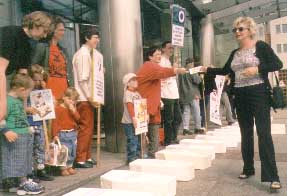 |
Click
here for more demo pictures.
|


